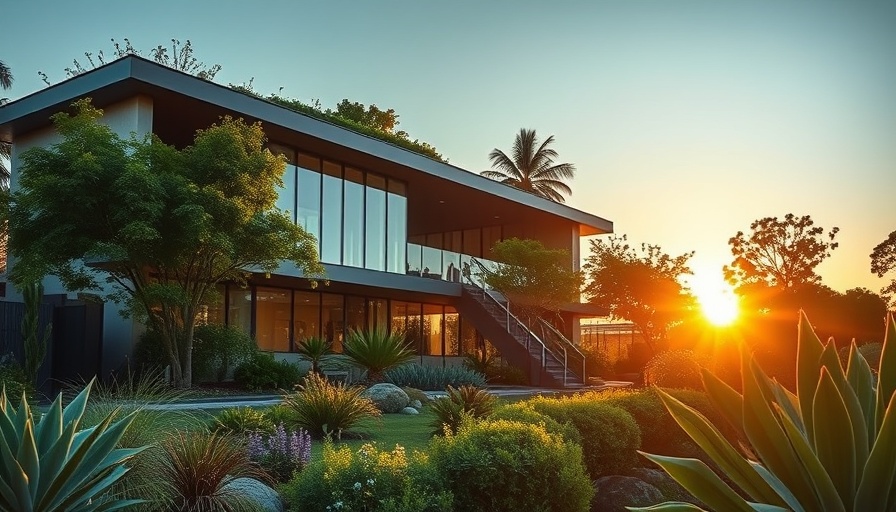
Why Sustainable Landscaping Matters in KwaZulu-Natal
As urban spaces expand and the demand for residential properties in KwaZulu-Natal grows, the importance of sustainable landscaping becomes increasingly evident. Not only does landscaping enhance aesthetic appeal, but it also fosters environmental awareness and biodiversity. In eco-focused estates like Serenity Hills, innovative landscaping strategies are being implemented to create habitats for local wildlife while preserving the region's unique coastal ecosystem.
Embrace Indigenous Flora for a Flourishing Environment
One of the foundational principles of sustainable landscaping is the use of indigenous plants. These botanicals are well-adapted to local climates and soil conditions, requiring less water and maintenance than non-native species. By incorporating plants like Aloe, Strelitzia Reginae (Bird of Paradise), and Dietes (Wild Iris), homeowners not only promote biodiversity but also enhance the overall beauty of their landscapes. Choosing plants that attract native wildlife, such as pollinators and birds, further enriches the ecological impact of landscaping efforts.
Pollinator Plants: Supporting Vital Ecosystems
Landscaping that intersperses pollinator plants serves dual purposes. First, it supports crucial pollinator species that play a vital role in maintaining the health of local ecosystems. Second, it adds visual interest and variety to residential gardens. Including plants like Tulbaghia violacea (Society Garlic) not only adds beauty but can also help reduce pest populations, making gardens healthier and more vibrant.
Minimal Soil Disturbance: A Vital Approach
Landscaping practices that minimize soil disturbance play an essential role in maintaining ecological balance. Methods such as preserving existing trees and reducing the amount of dug-up soil help to lower carbon emissions while maintaining the micro-ecosystems that exist within gardens. This practice not only aids sustainability but also ensures that landscapes remain resilient and adaptive to climatic changes.
Utilizing Local Materials for Natural Harmony
Incorporating locally sourced materials into landscaping designs celebrates the region's geological features and textures. Using materials such as stones, through pathways and wall features, creates a seamless connection between human activity and natural landscapes. This practice not only reduces transport-related emissions but also enhances the identity of the space, creating a richer, more cohesive aesthetic.
Innovative Water Management Techniques
Effective water management is pivotal in sustainable landscaping. Implementing systems for rainwater harvesting and utilizing greywater can drastically reduce the need for municipal water. Moreover, creating natural water features that mimic native habitats, like small dams or ponds, can attract wildlife and provide essential irrigation for plants while enhancing the overall landscape's visual appeal.
The Importance of Drainage Solutions
Proper drainage solutions in landscaped areas are critical, especially in regions prone to heavy rains. By employing natural materials like river sand in recreational facilities, landscapes can ensure effective water runoff and erosion control. This proactive measure makes outdoor spaces functional and sustainable while contributing to the preservation of local biodiversity.
Creating Conservation Spaces
Establishing conservation areas within residential estates can drastically enhance local biodiversity. Designing spaces for local flora and fauna to thrive ensures the relevance of these landscapes in ecological terms. Plans for butterfly zones and wildlife corridors contribute to maintaining a balanced ecosystem amidst the urban setting, attracting various species that can be supported within these areas.
Conclusion: Elevate Your Property Value and Foster Biodiversity
As the value of sustainable landscaping becomes increasingly recognized, property developers and homeowners in KwaZulu-Natal are seeing the benefits firsthand. By focusing on green building practices and eco-friendly designs, you can not only enhance the aesthetic appeal of your home but also contribute positively to the environment. Embracing sustainability in landscaping is essential for promoting biodiversity and creating thriving communities. For a holistic approach to your landscaping projects, explore innovative, eco-friendly options that will elevate your property value while fostering a deeper connection to nature.
 Add Row
Add Row  Add
Add 




Write A Comment